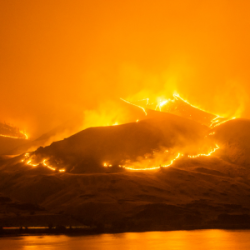Welcome readers! Please subscribe through the button on the right.

Our reading this week is from the Gospel of Luke:
“In the fifteenth year of the reign of Tiberius Caesar—when Pontius Pilate was governor of Judea, Herod tetrarch of Galilee, his brother Philip tetrarch of Iturea and Traconitis, and Lysanias tetrarch of Abilene—during the high-priesthood of Annas and Caiaphas, the word of God came to John son of Zechariah in the wilderness. He went into all the country around the Jordan, preaching a baptism of repentance for the forgiveness of sins. As it is written in the book of the words of Isaiah the prophet:
“A voice of one calling in the wilderness,
‘Prepare the way for the Lord,
make straight paths for him.
Every valley shall be filled in,
every mountain and hill made low.
The crooked roads shall become straight,
the rough ways smooth.
And all people will see God’s salvation.’ ” (Luke 3:1-6)
I love this week’s Advent reading for so many reasons.
The narrative has the “word of God” coming to John in an unusual location. John was a son of Zechariah the priest (Luke 1:5) and therefore, by lineage, he should not be in the wilderness acting like an ancient Hebrew prophet. He should have been occupying his place in the temple services, being a priest like his father. Instead, John rejected the path of working in the system or changing the system from the inside. I can imagine the struggle John might have gone through when he told his father that he wasn’t going to follow the family expectations and abandon a path toward priesthood for the margins of his society, the edges, and the wilderness.
The narrative’s contrast between the temple versus the wilderness resurrects a tension repeated by the Hebrew prophets: the centralized temple state and its priesthood versus those on the margins or edges of their society. The Hebrew prophets in the wilderness called for justice, for liberation, and for all violence against society’s vulnerable to cease.
This contrast takes on even more meaning when one realizes that one national myth of the Judean Temple-state was that Jerusalem and the Temple would eventually become the center of the world and all nations would flow to it. Consider these passages. All emphasis is added:
Psalms 2:6: “I have installed my king
on Zion, my holy mountain [the temple in Jerusalem].”
Psalms 14:7: Oh, that salvation for Israel would come out of Zion! [Jerusalem and the Temple]
When the LORD restores his people,
let Jacob rejoice and Israel be glad! (emphasis added,
Psalms 69:35-46: For God will save Zion [Jerusalem and the Temple]
and rebuild the cities of Judah.
Then people will settle there and possess it; the children of his servants will inherit it,
and those who love his name will dwell there.
Psalms 102:15-16: The nations will fear the name of the LORD,
all the kings of the earth will revere your glory.
For the LORD will rebuild Zion [Jerusalem and the Temple]
and appear in his glory.
He will respond to the prayer of the destitute;
he will not despise their plea.
Let this be written for a future generation,
that a people not yet created may praise the LORD:
“The LORD looked down from his sanctuary on high,
from heaven he viewed the earth,
to hear the groans of the prisoners
and release those condemned to death.”
So the name of the LORD will be declared in Zion [Jerusalem and the Temple]
and his praise in Jerusalem
when the peoples and the kingdoms
assemble to worship the LORD.
Isaiah 4:5: Then the LORD will create over all of Mount Zion [Jerusalem and the Temple] and over those who assemble there a cloud of smoke by day and a glow of flaming fire by night; over everything the glory will be a canopy.
Isaiah 18:7: At that time gifts will be brought to the LORD Almighty
from a people tall and smooth-skinned,
from a people feared far and wide,
an aggressive nation of strange speech,
whose land is divided by rivers—
the gifts will be brought to Mount Zion [Jerusalem and the Temple], the place of the Name of the LORD Almighty.
Isaiah 60:10-14: “Foreigners will rebuild your walls,
and their kings will serve you.
Though in anger I struck you,
in favor I will show you compassion.
Your gates will always stand open,
they will never be shut, day or night,
so that people may bring you the wealth of the nations—
their kings led in triumphal procession.
For the nation or kingdom that will not serve you will perish;
it will be utterly ruined.
“The glory of Lebanon will come to you,
the juniper, the fir and the cypress together,
to adorn my sanctuary;
and I will glorify the place for my feet.
The children of your oppressors will come bowing before you;
all who despise you will bow down at your feet
and will call you the City of the LORD,
Zion of the Holy One of Israel. [Jerusalem and the Temple] (emphasis added)
In the gospels, John rejects all of this. He turns his back on the city and its temple and takes up residence along the margins or the wilderness of his own society. The gospel message here, and one of my favorite Advent themes, is that salvation, change, and liberation don’t come from the center of our societies, but from the margins. We’ll explore this theme, next.
(Read Part 2)













